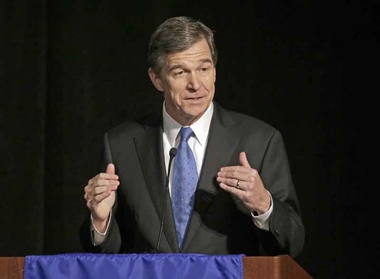New North Carolina governor to face resolute GOP legislature

RALEIGH, N.C. (AP) — North Carolina's next governor campaigned on a promise to work on bending back state government's recent rightward turn, with the repeal of a law limiting LGBT rights near the top of his to-do list.
But Democrat Roy Cooper, who secured victory as Republican incumbent Pat McCrory finally conceded Monday in their close race, will face a struggle to do any of that because the state legislature probably won't want to go along.
Republicans in the state House and Senate will continue to hold veto-proof majorities when they reconvene next month, a few days after Cooper — the outgoing attorney general — is sworn in. GOP leaders are resolute to keep their conservative policies intact and defend the LGBT law known as House Bill 2 that McCrory signed, refusing to change it unless it's on their terms.
"It's clear it's on social issues where Cooper and the Republican leadership are going to disagree the most," said David McLennan, a political science professor at Meredith College in Raleigh. "His first year could be difficult."
Cooper's victory was confirmed nearly four weeks after Election Day as McCrory announced in a video message it appeared Cooper was the winner.
McCrory released the concession message just before Durham County completed a state-ordered recount of more than 94,000 ballots that showed essentially no change in the tallies for Cooper and McCrory. After all counties completed their final tabulations late Monday, Cooper still had a statewide lead of just over 10,000 votes — slightly above the total needed to avoid an automatic recount if McCrory wanted one. The State Board of Elections was expected to certify the results by the end of the week.
Cooper, who released a written statement after McCrory's concession, scheduled a belated victory rally Tuesday night in Raleigh.
During the campaign, Cooper said he wanted to scrap House Bill 2, which he said promotes discrimination and harmed North Carolina's economic brand.
Cooper also said he wanted to raise teacher salaries to the national average and spend more on universities and community colleges. He criticized McCrory for reducing individual and corporate tax rates that he said benefited the wealthiest the most. But Cooper was careful to say only that he wanted to adjust taxes to help the middle class and small businesses.
"I'm going to stand up to this legislature when I think they're wrong, but I want us to move forward and I think we can find areas of agreement," Cooper said in an interview with The Associated Press in September.
Cooper will be in a position to skewer Republican policy decisions if he thinks they don't have broad, middle-class popularity, said Steven Greene, a political science professor at N.C. State University.
Unlike McCrory, who had no state government experience before being elected governor in 2012, Cooper is a veteran of Raleigh politics who may be able to negotiate some victories. He was Senate majority leader before elected attorney general in 2000.
"Don't underestimate the power of the governor," said Gary Pearce, a longtime state Democratic consultant who worked for four-term Gov. Jim Hunt. State government revenue surpluses also could make it easier for both Cooper and Republicans to get what they want.
"We hope Gov.-elect Cooper is willing to work with us to continue improving public education and cutting taxes on families and job creators," Senate leader Phil Berger, R-Rockingham, said in a news release.
Durham was one of more than 30 counties where formal protests were filed following the election. Many complaints said ballots were cast in the name of dead voters, felons or people who voted in another state, and should be thrown out.
State and local elections boards dismissed or set aside nearly all of the complaints until after the election.
Berger said he hoped Cooper would work with the legislature to address balloting problems that surfaced during the election. Cooper's campaign has said most of the protests filed were unfounded. The state board did agree to send the results of its absentee ballot investigation in one eastern North Carolina county to federal prosecutors so they could consider whether criminal charges are warranted.
___
By GARY D. ROBERTSON, Associated Press.
Associated Press writer Emery P. Dalesio contributed to this report.
Copyright Associated Press. All rights reserved.
The Gayly - 12/6/2016 @ 10:12 a.m. CST.





